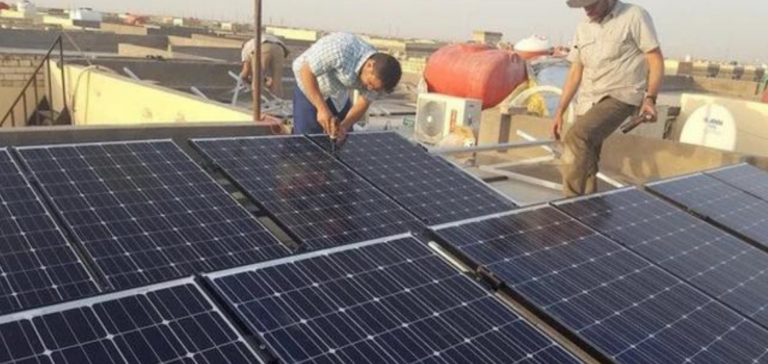In a hamlet perched high in the mountains of Iraqi Kurdistan, virtually every roof is covered with solar panels. But the Hazar Merd village remains an exception in a country where the authorities have yet to give concrete expression to their commitment to developing renewable energies. For an Iraq that is hostage to its oil wealth and hard hit by the effects of climate change, the issue is of paramount importance.
Ongoing challenges
On a daily basis, Iraq’s 43 million inhabitants live with the rhythm of power cuts, which worsen in summer when temperatures approach or even exceed 50 degrees Celsius. But the scarcity of solar power in one of the sunniest countries on the planet illustrates the difficulty of moving economies away from the ease of oil and gas, as dozens of countries will be demanding at the next COP28, in Dubai in November and December.
The solar initiative at Hazar Merd
Nestled in the mountains of autonomous Kurdistan, near Souleimaniyeh, a village has taken up the challenge of solar energy: in Hazar Merd, 17 of the 25 households have installed photovoltaic panels. “Solar covers all our needs: fridge, TV, (air) cooler, washing machine, vacuum cleaner,” sums up Daniar Abdallah, 33. “It’s been a great relief for us,” continues this father of two girls, who paid $2,800 (around €2,650) in 2018 to convert to solar power.
The challenge of generalization
The ambient calm is no longer disturbed by the roar of the large district generators used all over Iraq to compensate for power cuts, which are extremely polluting because they run on fossil fuels. “Before, we had a generator that broke down all the time,” continues Mr. Abdallah, a soldier in the local Kurdish forces. Especially as load shedding sometimes lasts “12 or 13 hours a day”. Following his example, “several friends in other villages rushed to install solar panels”, he adds.
Future plans for solar energy in Iraq
However, the phenomenon is still marginal. In Suleimaniyeh, the second-largest city in Iraqi Kurdistan, only 500 of the 600,000 households with public electricity are equipped with solar panels, admits department spokesman Sirouan Mahmoud. Solar power has been “progressing rapidly” since the regional parliament voted for incentives in 2021, he assures us. As a result, any household that supplies the authorities with solar energy it does not consume benefits from a reduction in its public electricity bill.
The challenges of solar energy in Iraq
Mr. Mahmoud points out that Kurdistan is planning to build three solar power plants with a total capacity of 75 megawatts (MW). In a country whose infrastructure has been ravaged by decades of conflict, and where governance is undermined by endemic corruption, Iraq’s power plants generate just 24,000 MW. To say goodbye to load shedding, the 32,000 MW threshold would have to be exceeded. Yet renewable energies remain under-exploited in the energy mix. Iraq enjoys more than 3,000 hours of sunshine out of the 8,700 hours in the year.
The growing adoption of solar energy in Hazar Merd and other parts of Iraqi Kurdistan is a sign of hope for a more sustainable energy future for the country. However, persistent challenges, such as oil dependency and the need to overcome logistical and financial obstacles, underline the difficult road to a successful energy transition.






















